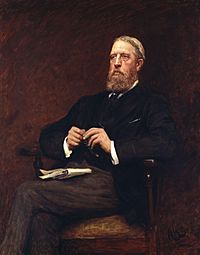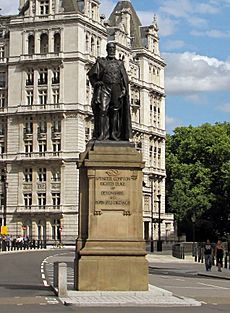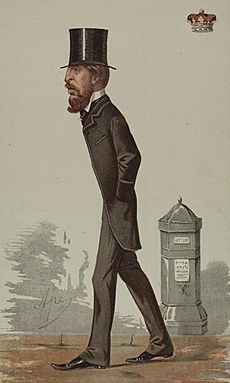Spencer Cavendish, 8th Duke of Devonshire facts for kids
Quick facts for kids
The Duke of Devonshire
|
|||||||||||||||||||||||||||||||||||||||||||||||||||||||||||||||
|---|---|---|---|---|---|---|---|---|---|---|---|---|---|---|---|---|---|---|---|---|---|---|---|---|---|---|---|---|---|---|---|---|---|---|---|---|---|---|---|---|---|---|---|---|---|---|---|---|---|---|---|---|---|---|---|---|---|---|---|---|---|---|---|
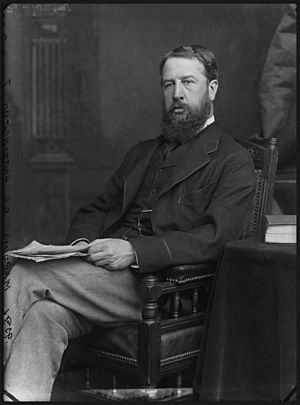
The 8th Duke of Devonshire, by Alexander Bassano, c. 1883
|
|||||||||||||||||||||||||||||||||||||||||||||||||||||||||||||||
| Leader of the House of Lords | |||||||||||||||||||||||||||||||||||||||||||||||||||||||||||||||
| In office 12 July 1902 – 13 October 1903 |
|||||||||||||||||||||||||||||||||||||||||||||||||||||||||||||||
| Monarch | Edward VII | ||||||||||||||||||||||||||||||||||||||||||||||||||||||||||||||
| Prime Minister | Arthur Balfour | ||||||||||||||||||||||||||||||||||||||||||||||||||||||||||||||
| Preceded by | The Marquess of Salisbury | ||||||||||||||||||||||||||||||||||||||||||||||||||||||||||||||
| Succeeded by | The Marquess of Lansdowne | ||||||||||||||||||||||||||||||||||||||||||||||||||||||||||||||
| President of the Board of Education | |||||||||||||||||||||||||||||||||||||||||||||||||||||||||||||||
| In office 3 March 1900 – 8 August 1902 |
|||||||||||||||||||||||||||||||||||||||||||||||||||||||||||||||
| Monarch | Victoria Edward VII |
||||||||||||||||||||||||||||||||||||||||||||||||||||||||||||||
| Prime Minister | The Marquess of Salisbury Arthur Balfour |
||||||||||||||||||||||||||||||||||||||||||||||||||||||||||||||
| Preceded by | Sir John Eldon Gorst | ||||||||||||||||||||||||||||||||||||||||||||||||||||||||||||||
| Succeeded by | The Marquess of Londonderry | ||||||||||||||||||||||||||||||||||||||||||||||||||||||||||||||
| Lord President of the Council | |||||||||||||||||||||||||||||||||||||||||||||||||||||||||||||||
| In office 29 June 1895 – 19 October 1903 |
|||||||||||||||||||||||||||||||||||||||||||||||||||||||||||||||
| Monarch | Victoria Edward VII |
||||||||||||||||||||||||||||||||||||||||||||||||||||||||||||||
| Prime Minister | The Marquess of Salisbury Arthur Balfour |
||||||||||||||||||||||||||||||||||||||||||||||||||||||||||||||
| Preceded by | The Earl of Rosebery | ||||||||||||||||||||||||||||||||||||||||||||||||||||||||||||||
| Succeeded by | The Marquess of Londonderry | ||||||||||||||||||||||||||||||||||||||||||||||||||||||||||||||
|
|||||||||||||||||||||||||||||||||||||||||||||||||||||||||||||||
|
|||||||||||||||||||||||||||||||||||||||||||||||||||||||||||||||
|
|||||||||||||||||||||||||||||||||||||||||||||||||||||||||||||||
| Personal details | |||||||||||||||||||||||||||||||||||||||||||||||||||||||||||||||
| Born | 23 July 1833 | ||||||||||||||||||||||||||||||||||||||||||||||||||||||||||||||
| Died | 24 March 1908 (aged 74) Cannes, France |
||||||||||||||||||||||||||||||||||||||||||||||||||||||||||||||
| Nationality | British | ||||||||||||||||||||||||||||||||||||||||||||||||||||||||||||||
| Political party | Liberal Unionist (1886–1908) Liberal (1857–1886) |
||||||||||||||||||||||||||||||||||||||||||||||||||||||||||||||
| Spouse | |||||||||||||||||||||||||||||||||||||||||||||||||||||||||||||||
| Parents | |||||||||||||||||||||||||||||||||||||||||||||||||||||||||||||||
| Alma mater | Trinity College, Cambridge | ||||||||||||||||||||||||||||||||||||||||||||||||||||||||||||||
| Military service | |||||||||||||||||||||||||||||||||||||||||||||||||||||||||||||||
| Allegiance | |||||||||||||||||||||||||||||||||||||||||||||||||||||||||||||||
| Branch/service | |||||||||||||||||||||||||||||||||||||||||||||||||||||||||||||||
| Unit | Duke of Lancaster's Own Yeomanry Sherwood Foresters 1st Sussex Artillery Volunteers |
||||||||||||||||||||||||||||||||||||||||||||||||||||||||||||||
Spencer Compton Cavendish, 8th Duke of Devonshire (born July 23, 1833 – died March 24, 1908) was an important British politician. He was known by different names during his life, like Lord Cavendish of Keighley and Marquess of Hartington.
What makes him special is that he led three different political parties: the Liberal Party, the Liberal Unionist Party, and the Conservative Party. He led them either in the House of Commons or the House of Lords. He was even asked to become Prime Minister three times but turned down the offer each time.
Contents
Early Life and Education
Spencer Compton Cavendish was the oldest son of William Cavendish, 7th Duke of Devonshire. His mother was Lady Blanche Cavendish. He had two younger brothers, Lord Frederick Cavendish and Lord Edward Cavendish.
He went to Trinity College, Cambridge, a famous university. He earned a Master of Arts degree in 1854. Later, he received honorary degrees from Cambridge and Oxford University.
He continued his interest in education throughout his life. He became the leader (Chancellor) of Cambridge University in 1892. He also led Manchester University from 1907 until he passed away. From 1877 to 1880, he was the Lord Rector of Edinburgh University.
Political Career: The Liberal Years (1857–1886)
Spencer Cavendish started his political journey in 1857. He was elected to Parliament as a Liberal representative for North Lancashire. At this time, he was known as Lord Hartington. He could sit in the House of Commons because he wasn't a Duke yet. He became Duke of Devonshire in 1891 after his father died.
From 1863 to 1874, Lord Hartington held several government jobs. These included roles in the Admiralty and as Under-Secretary of State for War. In 1868, he lost his seat in Parliament but was still made Postmaster-General. He got back into the House of Commons the next year. In 1870, he became the Chief Secretary for Ireland in William Ewart Gladstone's government.
In 1875, after the Liberal Party lost a general election, Lord Hartington became the leader of the Liberal opposition in the House of Commons. This happened after Gladstone stepped down. However, Gladstone later returned to politics, becoming very popular again.
In 1880, after another election, Queen Victoria asked Lord Hartington to form a government. But he said no, because Gladstone made it clear he would only serve as Prime Minister himself. So, Lord Hartington served in Gladstone's government instead. He was Secretary of State for India (1880–1882) and then Secretary of State for War (1882–1885).
During his time as War Secretary, he played a role in sending General Gordon to Sudan. This mission was meant to evacuate people, but it ended in a tragic siege and massacre in Khartoum. Many people blamed the government, including Hartington, for acting "too late."
Political Career: The Liberal Unionist Years (1886–1908)
Lord Hartington became unhappy with Gladstone's policies for Ireland. This was especially true after his younger brother, Lord Frederick Cavendish, was murdered in Phoenix Park. He then completely broke away from Gladstone.
He refused to join Gladstone's third government, which supported Irish Home Rule (giving Ireland more self-governance). Instead, he led a new group called the Liberal Unionists. This group opposed Home Rule.
After the 1886 election, Lord Hartington again turned down the chance to become Prime Minister. He preferred to support the Conservative government from the sidelines. In 1887, he was offered the premiership for a third time but declined once more.
In 1891, he became the Duke of Devonshire after his father's death. This meant he moved from the House of Commons to the House of Lords. In 1893, he officially opposed the Second Home Rule Bill in the House of Lords.
Devonshire joined Lord Salisbury's government in 1895. He served as Lord President of the Council and later as President of the Board of Education.
He resigned from the government in 1903. He also left the Liberal Unionist Association the next year. This was because he disagreed with Joseph Chamberlain's plan for Tariff Reform, which involved taxes on imported goods. Devonshire believed this plan was too much like socialism, where the government controls trade and industry.
In late 1907, his health began to fail. He passed away suddenly in Cannes, France, on March 24, 1908.
Military Service
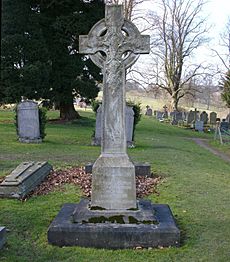
Besides his political career, Spencer Cavendish also served in the military part-time. He was a captain in the Duke of Lancaster's Own Yeomanry from 1855 to 1873. He was also an honorary colonel for the 3rd Battalion of the Derbyshire Regiment and the 2nd Sussex Artillery Volunteers.
Family Life
Spencer Compton Cavendish married Louisa Frederica Augusta von Alten in 1892. She was the widow of the 7th Duke of Manchester. He was 59 years old when they married.
When he died, his nephew Victor Cavendish became the next Duke of Devonshire. Spencer Cavendish was buried at St Peter's Churchyard, Edensor, in Derbyshire.
There are statues of the Duke in London and Eastbourne.
Legacy and Impact
When the Duke of Devonshire died, the House of Lords did something very unusual. They stopped their meeting in his honor. This showed how much respect they had for him.
Many people admired him. He was seen as a very honest and wise leader. He was known for his calm manner and his strong belief in duty. He thought it was important for leaders to apply good ideas like free trade and scientific research to help Britain grow.
With 24 years of government service, the Duke of Devonshire had one of the longest ministerial careers in modern British politics.
Images for kids
 | Sharif Bey |
 | Hale Woodruff |
 | Richmond Barthé |
 | Purvis Young |


